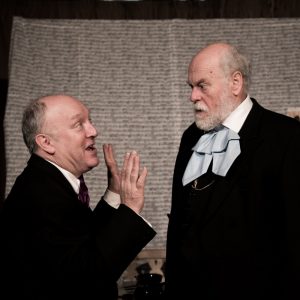
Alexander Ewers
Oysters (Mon-Sat at the Bakehouse Theatre until March 17) is an entertaining theatre production perhaps best described as comedy flavoured biopic. A sensitive and educational introspective into the legendary composer Johannes Brahms, the show sprawls widely across the artist’s life, sweeping before it a conglomeration of persons and periods that shaped the work and the soul of this musical genius.
Incarnated by the brilliant Neil Salvage, Brahms is introduced at a post-premiere party celebrating his famous Violin concerto in D Major. It is a portentous moment professionally and personally, the event representing a rich intersection of the people and pasts entwined throughout the story of the artist. In this heady milieu of influences and alcohol, the man is slowly unfolded to the listener. The audience learns of pain and privilege, the vagaries of fortune that elevate and cast down at whim, the perfectionism of genius and the curse of the self-same. It is a journey over the course of an hour from position of bedazzled bystander, cognisant only of greatness, to that of an intimate, privy to the griefs and glories that inspire and beset such artistic pre-eminence. And in intimacy is discovered nuance and complexity, the reality of a man perhaps best misknown then as now, solely for his music.
Oysters’ strengths lie in meticulous respect of historicity and an array of external perspectives to build and support protagonist development. There is a convincing quality to, and an internal consistency throughout the dialogues and scenes presented. This achievement rests on the solid bedrock of factual accuracy, a foundation that plays no small part in the believability of the performance. Similarly, the procession of characters through whom Brahms’ inner self is revealed, form a series of lenses by which the audience achieves a more adequately complex understanding of the man.
However, the same creative approach that is the show’s strength also becomes its weakness. As the pace builds, the growing character parade assumes the confusion of a character carousel, detracting from the messages underlying the plot. The performance begins to feel too busy, and the scenarios onstage a little contrived. Similarly, the metaphor of the oyster, arguably the crux of this performance given the titular emphasis, feels jarringly underdeveloped. The (assumed) intended weight of impact is diminished by an incohesively laid groundwork, it being an idea warranting a more comprehensive embedment within or elicitation from the story. As it is, the reference seems surprising in context, and unfortunately recedes rapidly from the forefront of memorable relevance.
One ought not to allow these criticisms to dissuade from attending this show though. Salvage and co-star Nicholas Collett are stalwarts of the London Theatre scene, and their performances here are masterful. Oysters remains exceptionally informative, a thought-provoking panegyric to one of the classical music world’s icons, and one that is truly enjoyable to those both native and naïve to this genre. Yes, Oysters is about Brahms. But its collateral beauty lies in the themes unearthed along the way: the isolating curse of fame; the disjunction between artistic ideal and audience/consumer perception; the ingredients from which artists are forged. Perhaps the most lasting lesson is captured best by a question. What is the cost of art? And to whom is the burden of that cost allotted: the artist or the consumers of that art?
Kryztoff Rating 3.5K


Recent Comments